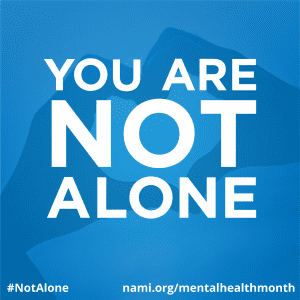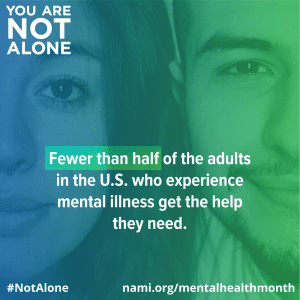May is Mental Health Awareness Month. Now more than ever, mental health care accessibility is on my mind. This year, the National Alliance on Mental Health’s theme is “You Are Not Alone,” which seems fitting in this isolating time. As a social worker and an individual with mental health struggles, I’ve long been passionate about sharing my story and helping people get connected to the help they need when they are struggling.
I know many people are struggling right now with anxiety, depression, panic attacks, and  difficulty sleeping (to name a few). You might be telling yourself “It’s just because of the pandemic. It will pass,” but even if you think the struggle is temporary, it doesn’t mean you don’t deserve help getting through it.
difficulty sleeping (to name a few). You might be telling yourself “It’s just because of the pandemic. It will pass,” but even if you think the struggle is temporary, it doesn’t mean you don’t deserve help getting through it.
There are so many therapists out there ready and able to help you through whatever you are struggling with, you don’t have to suffer alone. Here is a list of resources to help you find a therapist who can work with you from home, as well as psychiatrists who can prescribe medications if you need that support as well.
- Employee Assistance Program (EAP): If you or your partner are currently employed, check and see if either of you have an EAP. EAPs often offer a few free sessions of therapy, and some even include online options like Talkspace. They are also a good resource for finding a provider that takes your insurance.
- Insurance: If you have health insurance, check with your policy holder about your benefits. Websites like Psychology Today allow you to search for a therapist in your area and narrow down results by specialty and insurance providers. Just be aware that even if their profile says that they accept your insurance, you’ll need to call to verify that they are taking new patients and to confirm how they are are currently offering therapy, in person or via phone or video chat.

- Online therapy: Better Help and TalkSpace are the two most well known online therapy programs. You can get online therapy a variety of ways—phone calls, video chats, or even just texting/messaging if that’s more your style! Open Path is another option if you are uninsured or underinsured because all of their individual sessions are $60 or less (after you pay the lifetime membership fee of $59).
- Medication: Many individuals with mental health struggles find relief with medication (I am one of them!) Contact your primary care physician if you have one to talk about your options. Many will do a screening and prescribe medication if you are experiencing anxiety or depression. If you don’t have a physician or aren’t insured, contact your nearest community mental health center (do a Google search for your city + community mental health center to find it) for a screening. Most charge on a sliding scale based on income. There are also online psychiatry services that can prescribe meds, such as Talkspace Psychiatry. If you do have insurance, double check to see if telehealth is covered for psychiatry services as the wait for telehealth is much shorter than for an in-person appointment.
You are not alone and there are so many providers out there ready and willing to help you with whatever mental health struggles you are dealing with. Reach out, you’re worth it.
















